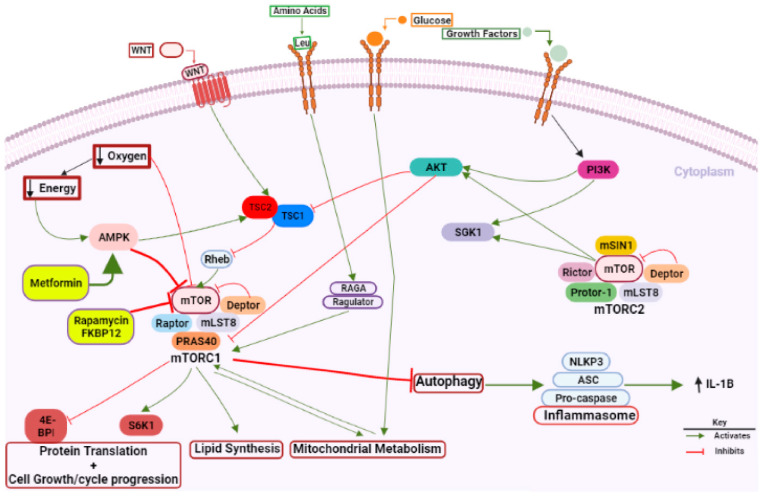Figure 1.
mTOR signaling pathway. mTOR is activated by the presence of growth factors, glucose, amino acids, WNT at the cell-surface, and by several intracellular clues. Signaling to mTORC1 is stimulated by growth factors, WNT via PI3K/AKT signaling. In an environment with sufficient nutrients, the autophagy process is negatively regulated by mTOR. AMPK activation, starvation, or hypoxia inhibit mTOR. Rapamycin, the inhibitor of mTOR, represses autophagy, and regulates inflammation. There is cross-talk between inflammasomes and autophagy to maintain homeostasis among the inflammatory response against pathogens and inhibition of disproportionate inflammation. During mTOR inhibition of autophagy, NLRP3 inflammasome activation is enhanced, and this effect is reversed after rapamycin treatment. Metformin enhances autophagy and inhibits NLRP3 inflammasome via AMPK/mTOR signaling inhibition. mTOR is implicated in several biological processes: protein translation, cell growth/cycle progression, lipid synthesis, and mitochondrial metabolism. Created with BioRender.com. 4EBP1: eukaryotic translation initiation factor 4E-binding protein 1; AMPK: AMP-activated protein kinase; ASC: C-terminal caspase recruitment domain; mTOR: mammalian target of rapamycin; NLRP3: nucleotide-binding oligomerization domain (NOD)-like receptor protein 3; RAG: regulator; RHEB: ras homolog enriched in brain; S6 Kinase 1: ribosomal protein S6 kinase beta-1; TSC: tuberous sclerosis complex. Figure created with BioRender.com (last accessed on 16 July 2022).

